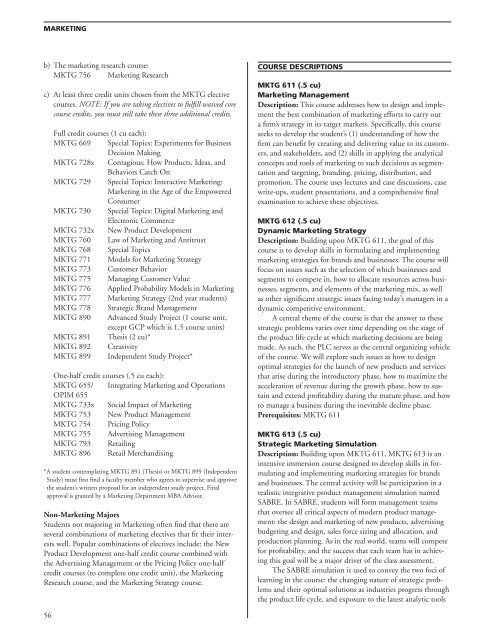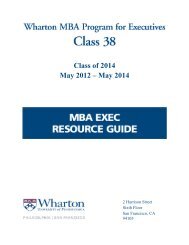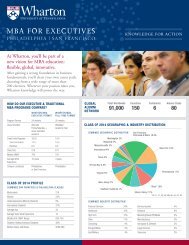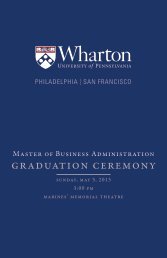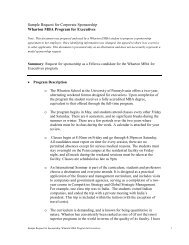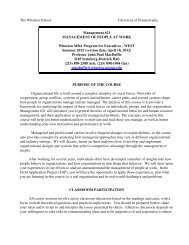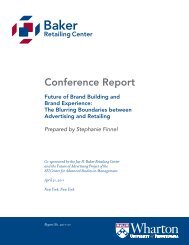Explore Options; Plan Your MBA Academic Program
Explore Options; Plan Your MBA Academic Program
Explore Options; Plan Your MBA Academic Program
Create successful ePaper yourself
Turn your PDF publications into a flip-book with our unique Google optimized e-Paper software.
MARKETING<br />
b) The marketing research course:<br />
MKTG 756 Marketing Research<br />
c) At least three credit units chosen from the MKTG elective<br />
courses. note: if you are taking electives to fulfill waived core<br />
course credits, you must still take these three additional credits.<br />
56<br />
Full credit courses (1 cu each):<br />
MKTG 669 Special Topics: Experiments for Business<br />
Decision Making<br />
MKTG 728x Contagious: How Products, Ideas, and<br />
Behaviors Catch On<br />
MKTG 729 Special Topics: Interactive Marketing:<br />
Marketing in the Age of the Empowered<br />
Consumer<br />
MKTG 730 Special Topics: Digital Marketing and<br />
Electronic Commerce<br />
MKTG 732x New Product Development<br />
MKTG 760 Law of Marketing and Antitrust<br />
MKTG 768 Special Topics<br />
MKTG 771 Models for Marketing Strategy<br />
MKTG 773 Customer Behavior<br />
MKTG 775 Managing Customer Value<br />
MKTG 776 Applied Probability Models in Marketing<br />
MKTG 777 Marketing Strategy (2nd year students)<br />
MKTG 778 Strategic Brand Management<br />
MKTG 890 Advanced Study Project (1 course unit,<br />
except GCP which is 1.5 course units)<br />
MKTG 891 Thesis (2 cu)*<br />
MKTG 892 Creativity<br />
MKTG 899 Independent Study Project*<br />
One-half credit courses (.5 cu each):<br />
MKTG 655/ Integrating Marketing and Operations<br />
OPIM 655<br />
MKTG 733x Social Impact of Marketing<br />
MKTG 753 New Product Management<br />
MKTG 754 Pricing Policy<br />
MKTG 755 Advertising Management<br />
MKTG 793 Retailing<br />
MKTG 896 Retail Merchandising<br />
* A student contemplating MKTG 891 (Thesis) or MKTG 899 (Independent<br />
Study) must first find a faculty member who agrees to supervise and approve<br />
the student’s written proposal for an independent study project. Final<br />
approval is granted by a Marketing Department <strong>MBA</strong> Advisor.<br />
Non-Marketing Majors<br />
Students not majoring in Marketing often find that there are<br />
several combinations of marketing electives that fit their interests<br />
well. Popular combinations of electives include: the New<br />
Product Development one-half credit course combined with<br />
the Advertising Management or the Pricing Policy one-half<br />
credit courses (to complete one credit unit), the Marketing<br />
Research course, and the Marketing Strategy course.<br />
COURSE DESCRIPTIONS<br />
MKTG 611 (.5 cu)<br />
Marketing Management<br />
Description: This course addresses how to design and implement<br />
the best combination of marketing efforts to carry out<br />
a firm’s strategy in its target markets. Specifically, this course<br />
seeks to develop the student’s (1) understanding of how the<br />
firm can benefit by creating and delivering value to its customers,<br />
and stakeholders, and (2) skills in applying the analytical<br />
concepts and tools of marketing to such decisions as segmentation<br />
and targeting, branding, pricing, distribution, and<br />
promotion. The course uses lectures and case discussions, case<br />
write-ups, student presentations, and a comprehensive final<br />
examination to achieve these objectives.<br />
MKTG 612 (.5 cu)<br />
Dynamic Marketing Strategy<br />
Description: Building upon MKTG 611, the goal of this<br />
course is to develop skills in formulating and implementing<br />
marketing strategies for brands and businesses. The course will<br />
focus on issues such as the selection of which businesses and<br />
segments to compete in, how to allocate resources across businesses,<br />
segments, and elements of the marketing mix, as well<br />
as other significant strategic issues facing today’s managers in a<br />
dynamic competitive environment.<br />
A central theme of the course is that the answer to these<br />
strategic problems varies over time depending on the stage of<br />
the product life cycle at which marketing decisions are being<br />
made. As such, the PLC serves as the central organizing vehicle<br />
of the course. We will explore such issues as how to design<br />
optimal strategies for the launch of new products and services<br />
that arise during the introductory phase, how to maximize the<br />
acceleration of revenue during the growth phase, how to sustain<br />
and extend profitability during the mature phase, and how<br />
to manage a business during the inevitable decline phase.<br />
Prerequisites: MKTG 611<br />
MKTG 613 (.5 cu)<br />
Strategic Marketing Simulation<br />
Description: Building upon MKTG 611, MKTG 613 is an<br />
intensive immersion course designed to develop skills in formulating<br />
and implementing marketing strategies for brands<br />
and businesses. The central activity will be participation in a<br />
realistic integrative product management simulation named<br />
SABRE. In SABRE, students will form management teams<br />
that oversee all critical aspects of modern product management:<br />
the design and marketing of new products, advertising<br />
budgeting and design, sales force sizing and allocation, and<br />
production planning. As in the real world, teams will compete<br />
for profitability, and the success that each team has in achieving<br />
this goal will be a major driver of the class assessment.<br />
The SABRE simulation is used to convey the two foci of<br />
learning in the course: the changing nature of strategic problems<br />
and their optimal solutions as industries progress through<br />
the product life cycle, and exposure to the latest analytic tools


